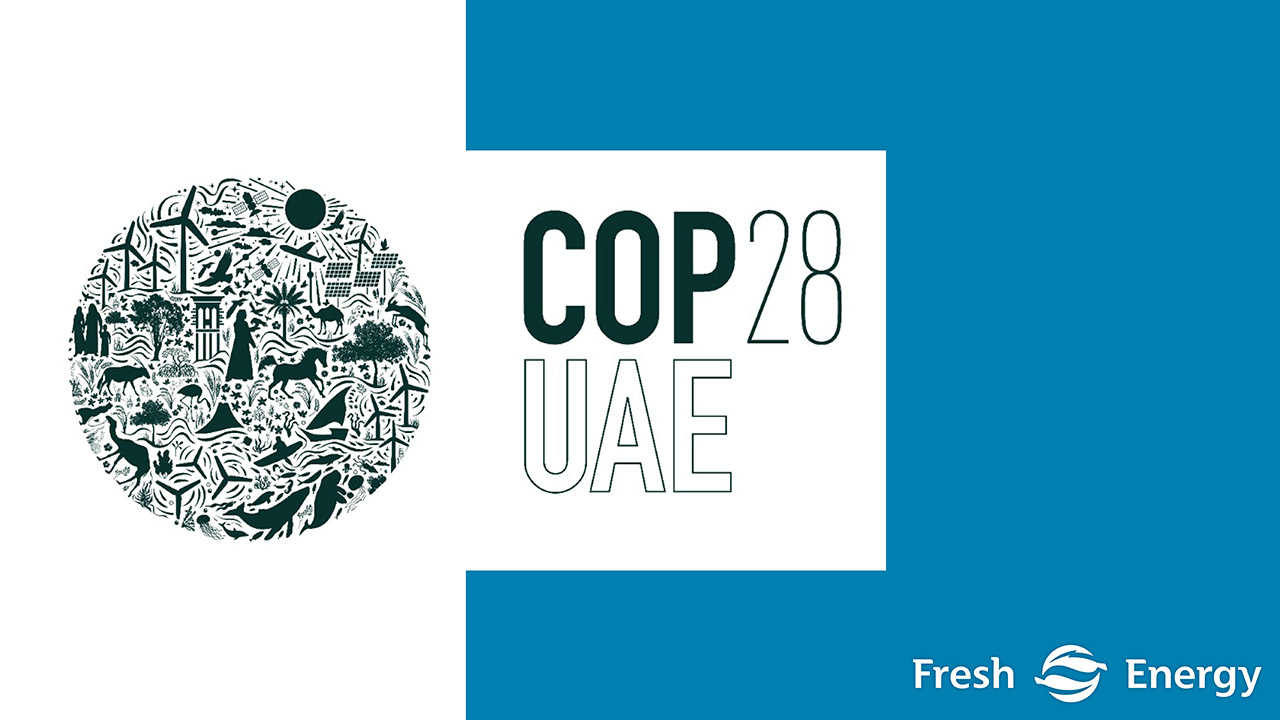
2023 will be is J.’s eighth year at the U.N. Climate Change Conference! Stay tuned to this page for updates ahead of COP28 and daily during the conference.
December 12 | COP28 ends with a final, breakthrough update
As COP28 drew to a close, COP President Sultan Al Jaber addressed all the Parties to the UNFCCC treaty in the Closing Plenary, in which Parties notably passed an agreement that includes “transitioning away from fossil fuels in energy systems, in a just, orderly and equitable manner.” The inclusion of explicit language calling for a move away from coal, oil, and gas is being hailed as a major breakthrough. This agreement was reached overnight by President Al Jaber; it signals the start of the end of the fossil fuel era.

The leader of the U.S. diplomats, John Kerry, spoke from the floor, citing that the required “target for all nation’s new Nationally Determined Contribution climate plans must be aligned with the globe’s 1.5-degree target: greenhouse gas emissions must peak by 2025, be reduced by 43% by 2030, and reduced by 60% by 2035.”
I’ll share more in my webinar on Friday, which you can still register for, to debrief outcomes from the Summit and answer questions about the event. See you then!
December 11 | COP28 Draws Near to a Close
On December 11, COP28 President Dr. Sultan Al Jabar posted:
The COP28 Presidency has been clear from the beginning about our ambitions. The draft text reflects those ambitions and is a huge step forward. Now it is in the hands of the Parties, who we trust to do what is best for humanity and the planet. We have made progress, but we still have a lot to do. I want you to deliver the highest ambition on all items, including on fossil fuels.”
The draft text of the First Global Stocktake under the Paris Agreement was dated December 11, 4:30 pm in Dubai. This text will likely be edited before it is finalized; for now, here is some of the current language:
We identified a need for deep, rapid, and sustained decreases in greenhouse gas emissions.
To achieve our Paris Agreement goal to limit the global temperature increase to 1.5 degrees C above pre-industrial levels, the world’s peak greenhouse gas emissions must occur before 2025, and must be reduced by 43% by 2030 and reduced by 60% by 2035.
Parties are called upon to take actions including:
a. Tripling renewable energy capacity globally and doubling the global average annual rate of energy efficiency improvement, by 2030
b. Decrease consumption and production of fossil fuels so as to achieve net zero by, before, or about 2050
c. Phasing out of inefficient fossil fuel subsidies that encourage wasteful consumption and do not address energy poverty or just transitions as soon as possible
All Developed Parties must submit next Nationally Determined Commitments with ambitious economy-wide emissions reduction targets covering all greenhouse gases and all sectors, so as to meet the 1.5 degrees C limit.
I will be traveling home to Minnesota from midnight on December 12 for about 24 hours, and while COP28 is drawing near to a close, there are still some developments underway that may be finalized as late as Wednesday and Thursday.
Join me this Friday, December 15 from 9-10 a.m. for my webinar, “COP28 and Fresh Energy: Discussions with J. Drake Hamilton” where I will debrief outcomes from the Summit and answer questions about the event. I hope to see you there!

December 10 | Seven U.S. Senators Discuss Congressional Support for Climate Action
Senator Ben Cardin (D-MD) led a bipartisan group of U.S. Senators to speak on multiple occasions in Dubai. He was joined on stage by Senator Carper (D-DE), Senator Coons (D-DE), Senator Markey (D-MA), Senator Murkowski (R-AK), Senator Schatz (D-HI) and Senator Whitehouse (D-RI). For many, COP28 was their fifth or sixth COP.
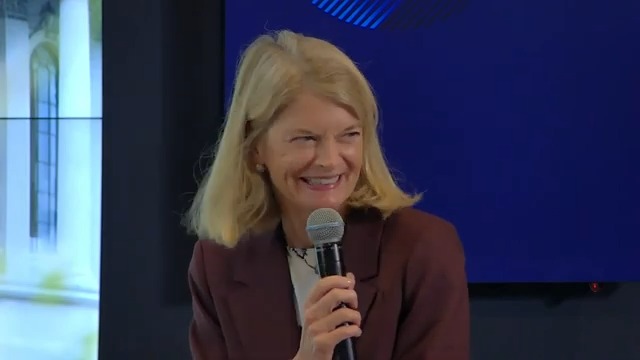
I was fortunate to see all seven of these Senators in the room together, one of many, many multi-Senator presentations they made the last week of COP28. Senator Cardin, chair of the Senate Foreign Relations Committee, spoke to his environmental interests in his fifth COP as well as his concern about the security of borders because of likely millions of climate refugees. Sen. Cardin said, “We all have to do much more. All of us together—those of us in government alongside with those in the private sector—and we are here at COP28 to help determine what we can do MORE of.” Senator Coons answered questions about how he manages to get much work done in a divided Congress; Sen. Coons’ leadership was lauded by his colleagues as “leadership that is wise and makes Congressional action that can survive future changes.”
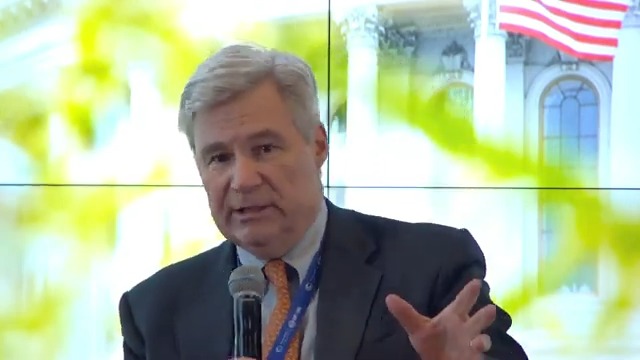
Senator Sheldon Whitehouse was asked by the moderator to comment on the industrial sector being responsible for about 25 percent of greenhouse gas emissions, and his comments about the new Carbon Border Adjustment Mechanism (CBAM). Sen. Sheldon applauds that CBAM “puts a price on carbon.”
He added that the U.S. Methane Enforcement Task Force is critical, as we need American enforcement capacity that will use satellite imagery to locate leaks of methane and the, ”task force will deploy immediate resources to shut off U.S. methane links. That correction will send a message to do so in the rest of the world.”
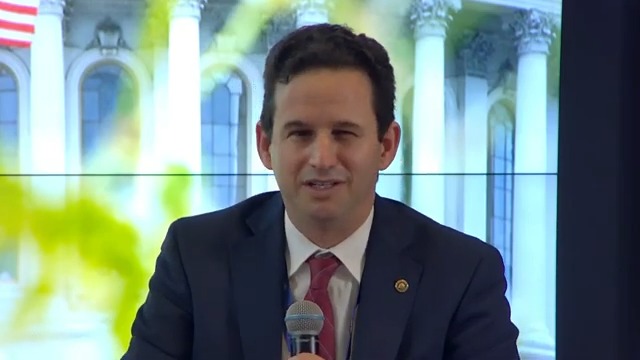
Senator Schatz provided helpful advice to the primarily young audience at the U.S. Center. Sen. Schatz said, “opportunities for climate action under the Inflation Reduction Act are immense, but I wish to advise you not to focus on ‘wind’ or ‘solar’ or ‘batteries,’ but to embrace the word ‘and’ and not ‘or.’ Be excited about ALL the action we can now take. We have to say, ‘Yes, AND…’ and know that we need to do all the things in order to hold warming to 1.5 degrees C.”
Sen. Schatz has noticed despondency about the climate crisis. He stressed that people should turn their outrage and despondency into anger (toward fossil fuel interests) and into action. His last words: “We in the U.S. need to be about building things.”
Every Senator on the stage was passionate about the need for much more climate action to help the most vulnerable people, in their own states and in the world.
December 10 | Sustaining the Future of our Blue Economy, Guest Blog Post for Fresh Energy from Jie (Jamie) Yang
Today I’ve invited Jamie Yang, a Master of Public Policy candidate finishing her final year at the University of Chicago, to publish a guest COP28 blog post. Jamie is passionate about climate impact investing and has worked as a summer analyst at the International Finance Corporation of the World Bank Group and joined Chicago Policy Review as a staff writer. At COP28, she is learning the most cutting-edge impact investing practices and observing climate negotiations and technology innovations that are contributing to limiting global warming. Before coming to the U.S., Jamie spent her life studying in the Great Bay Area of China, which spans across Guangzhou, Shenzhen, and Hong Kong.
I had the great pleasure of getting to know Jamie at this year’s climate conference and invited her to share her work with our readers. Without further ado, welcome, Jamie:
Written by Jamie Yang:
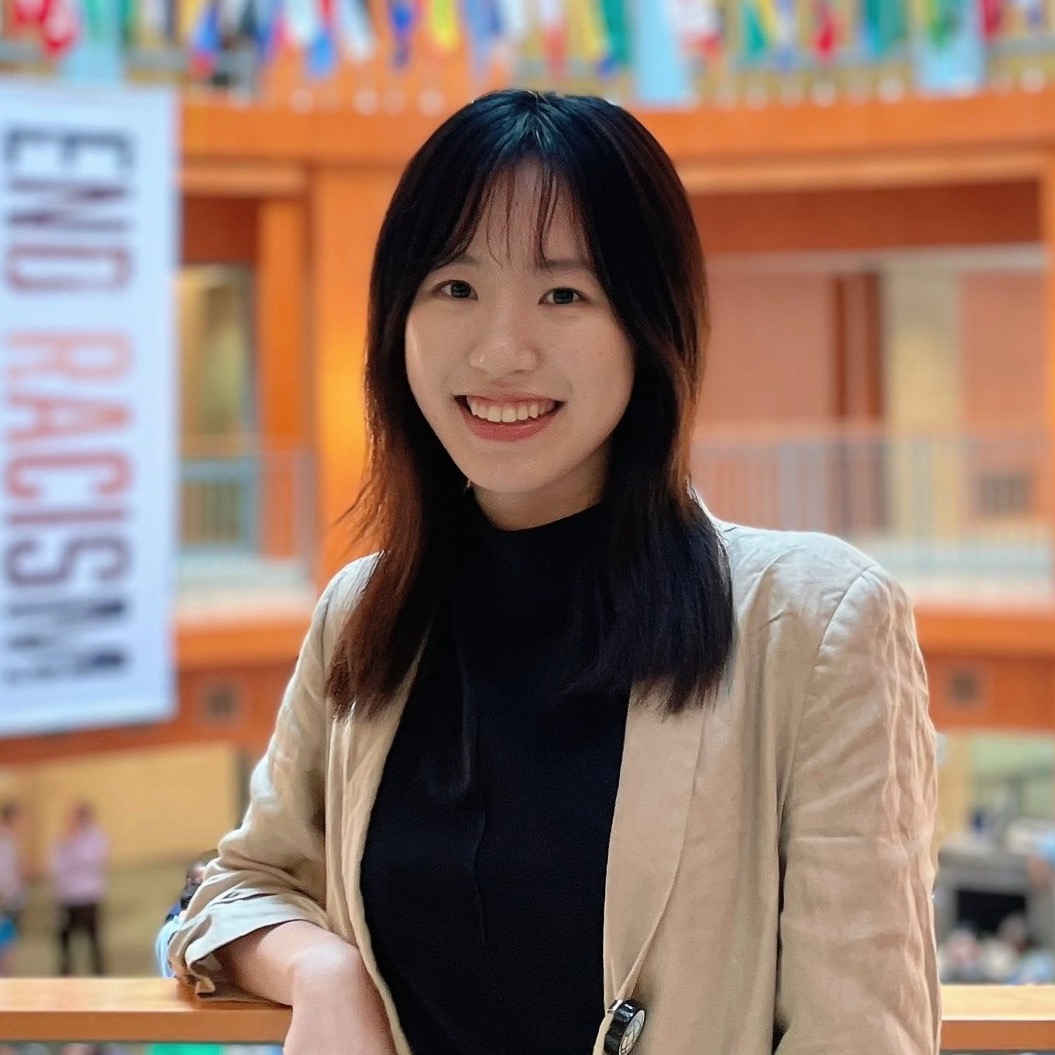
On December 9 the International Finance Corporation (IFC), an international financial institution and World Bank Group member, hosted the event “Sustaining the Future of our Blue Economy” at the World Bank Group Pavilion. The event emphasized the critical role of the world’s “blue resources” which support the livelihoods of over 3 billion people. The discussion focused on the blue economy’s significance in addressing the climate crisis with a specific emphasis on the private sector’s responsibility to preserve these crucial carbon sinks while sustaining local economies and jobs.
Mehmet Mumcuoglu, representing IFC, opened the discussion by addressing the challenge of scaling up blue finance. The goal is to reach $3 trillion by 2030, acknowledging that many marine resources are currently exploited in a non-sustainable manner. He highlighted alarming statistics, such as 10 million tons of plastic entering the ocean annually, resulting in the death of 1 million marine animals each year. Additionally, 30% of the global fishery operates in an unsustainable manner.
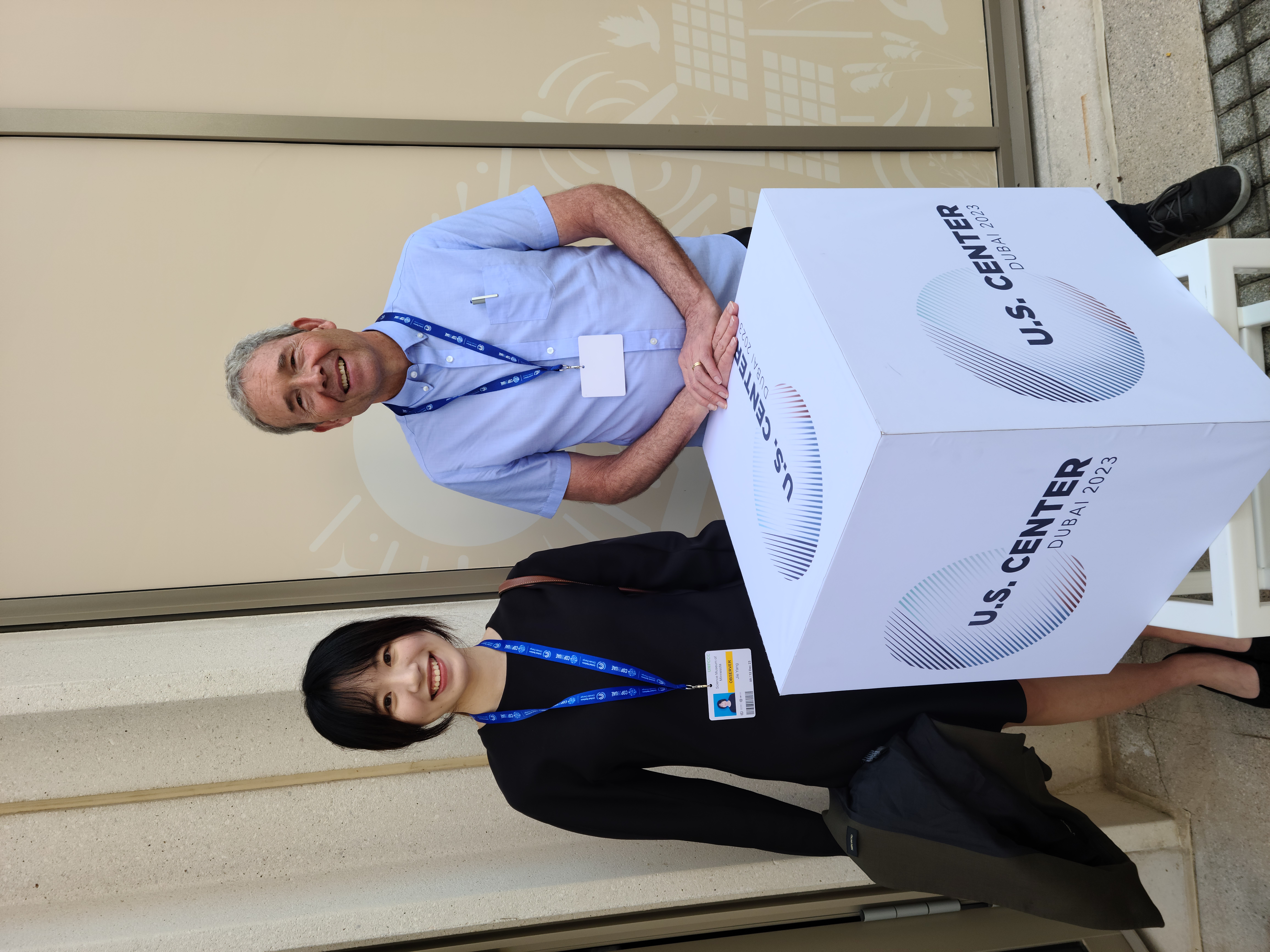
Panelists also delved into the challenges faced by asset managers in raising blue finance money. Cultural and identity ties to water make it a challenging and sensitive issue, posing difficulties in fundraising. Collaborations with Multilateral Development Banks (MDBs) were highlighted, and guidance has been published to support blue initiatives, particularly in marine renewable energy. Panel discussions centered around stressing the importance of recognizing blue finance as an asset type, suggesting that it hasn’t received adequate attention.
December 8 | Dear World Leaders: A Message from Youth
This morning I decided to attend a presentation called “Dear World Leaders: A Message from Youth,” featuring five young Americans speaking eloquently at the esteemed U.S. Center federal pavilion at COP28.
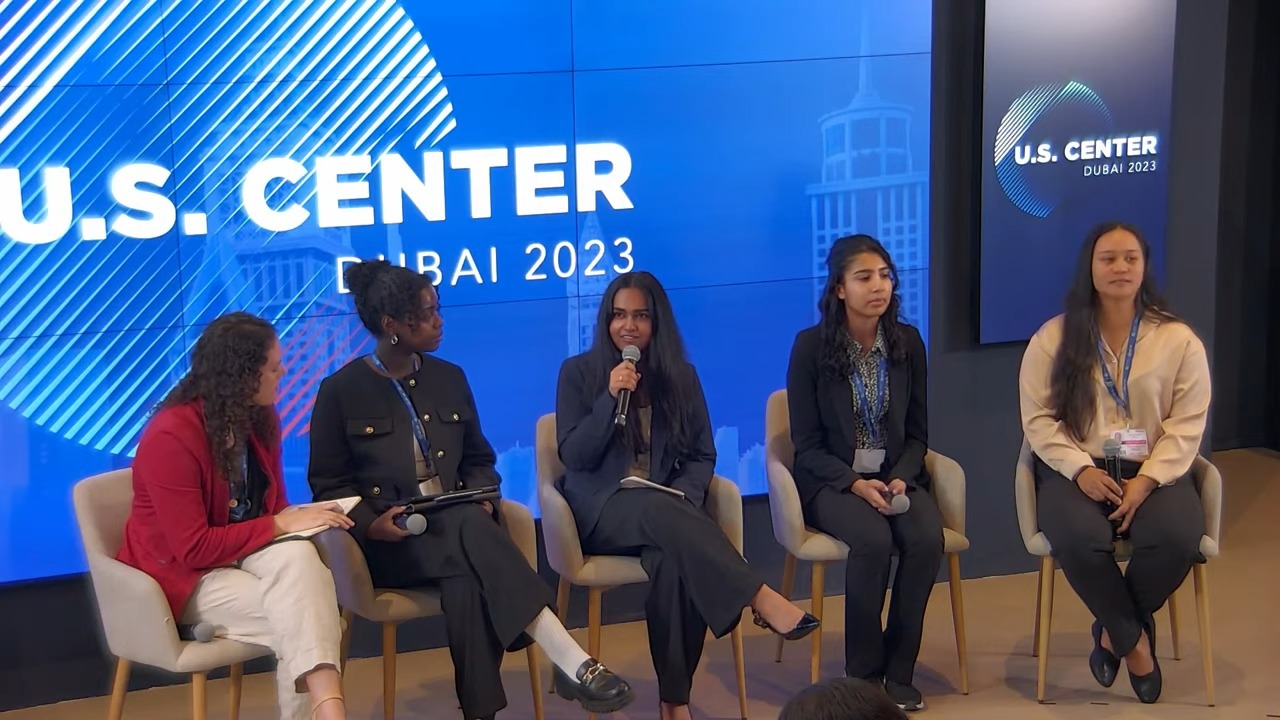
The moving event stressed that “we all have a responsibility to act.” The speakers—all young women—were exhilarated that they spoke on the second-ever Youth Day for the UNFCCC. The hour highlighted their message to world leaders: to give young people a chance of a healthy and safe future. The youth were from places including Chicago, Philadelphia, Hawaii, Michigan, and Guam; some are college students, one is a young professional biologist, and one is a high school senior. The young leaders noted that the average age of climate policy makers, by contrast, is sixty-five years old. They did an excellent job of empowering and lifting up youth voices and pointedly addressing much older decision-makers.
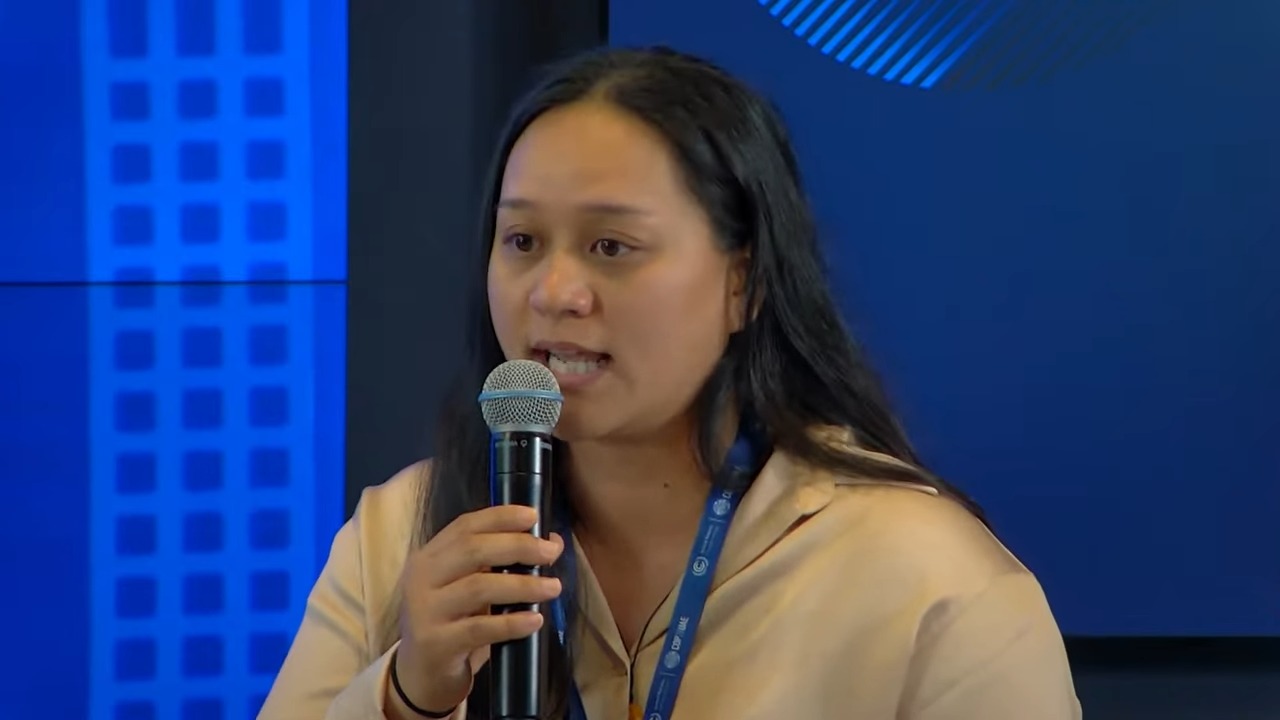
Raina Taitingfong, an Indigenous woman who was born, raised, and still lives in Guam where she works to save wildlife on all small Pacific islands, asked, “If we lose our home of Guam, will we have a future, will we have our culture?”
The speakers ended by stating, “We want you to hear us. We need your decisive climate action. It’s our future.”
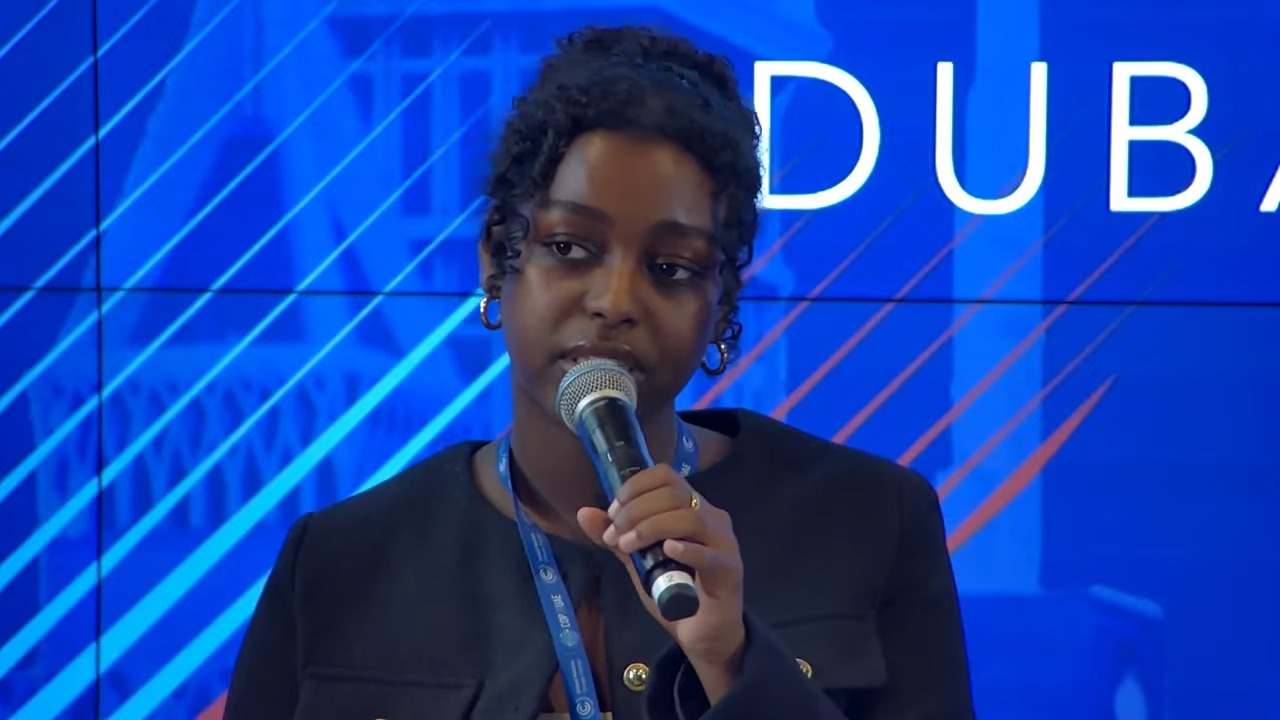
Interestingly, on the same morning, young people from Australia gave a similarly stirring presentation to Aussie diplomats.
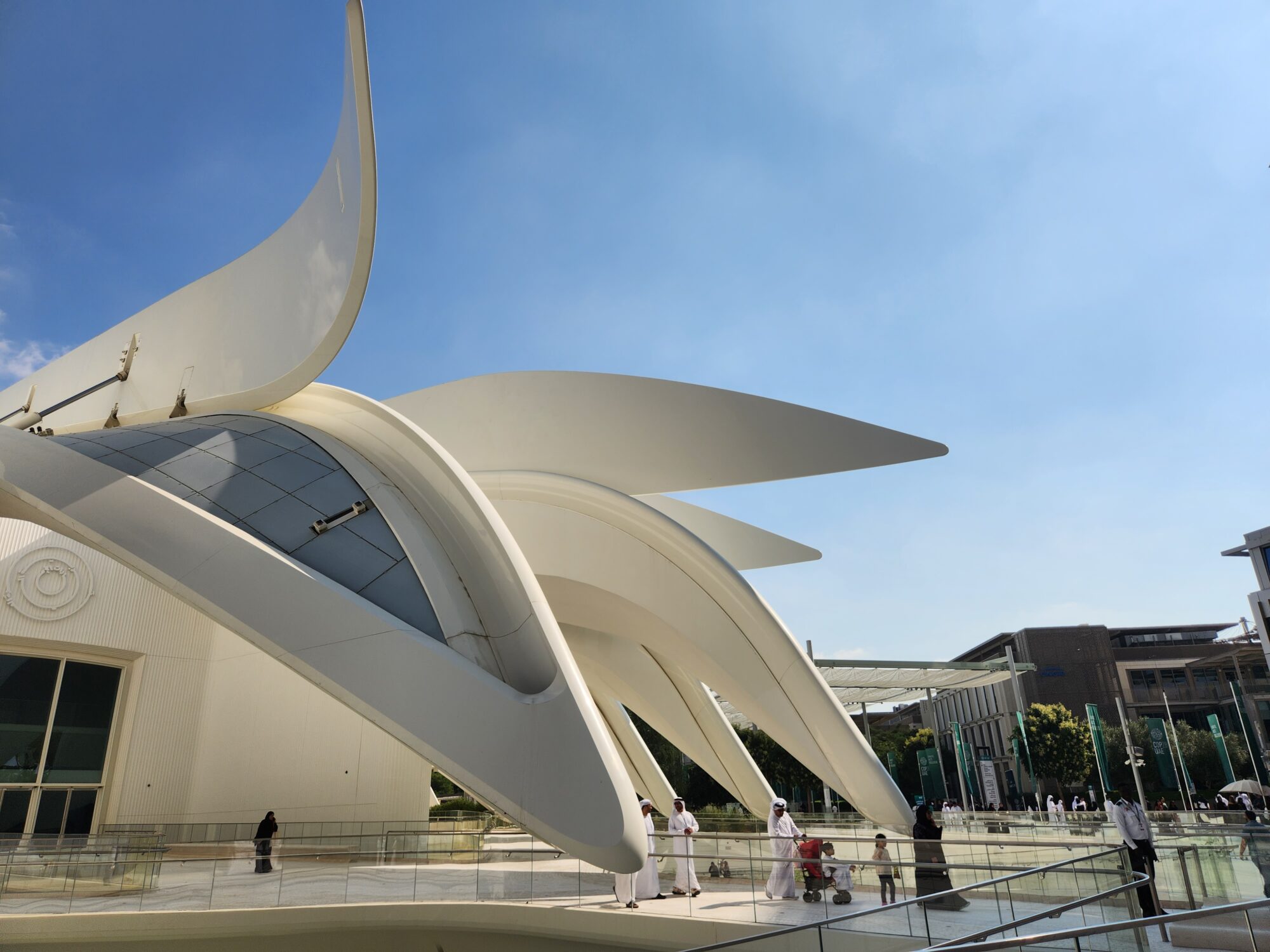
December 6 | Remarks from John Kerry and Al Gore
Yesterday, I heard directly from John Kerry, Special Presidential Envoy for Climate, and from Former Vice President Al Gore.
I was invited to attend the Bloomberg Green Summit held at Dubai’s Jumeirah Emirates Tower. Our first event was a 40-minute interview with the top U.S. diplomat at COP28, John Kerry. A word first about the host, Bloomberg Philanthropies: they helped retire 500 coal plants in the United States.
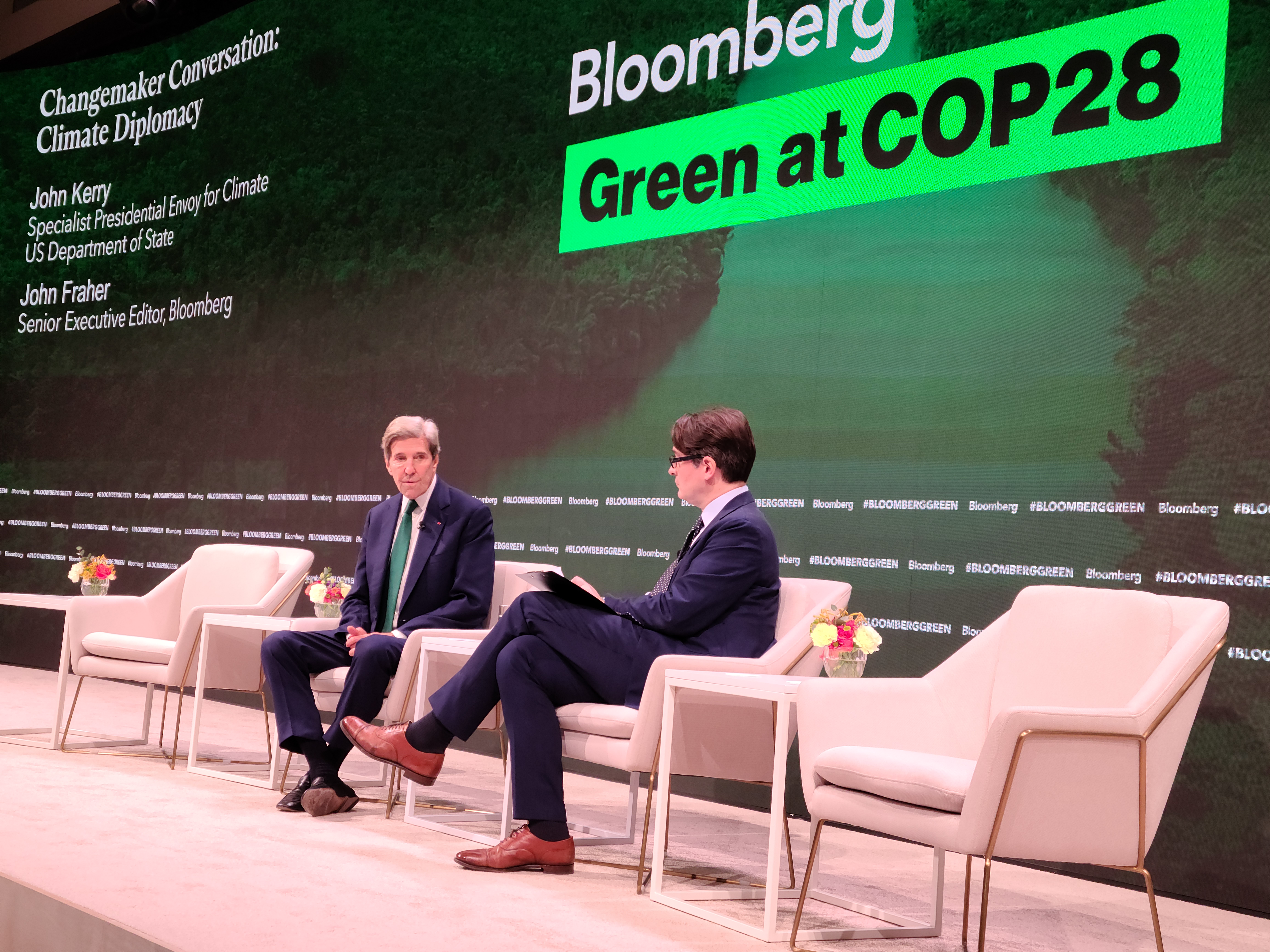
John Kerry was feeling very good on Tuesday morning. He began by stating definitively that the weather in many parts of the world has been alarming and terrifying to climate scientists. But he switched the conversation immediately to the fact that the transition to a global clean energy economy is not a sacrifice for anyone. After all, climate pollution is poisonous, so immediately reducing air pollution saves human lives right away.
The Bloomberg interviewer asked Kerry about an oil company, “What more can Chevron do (about climate change)?” Kerry’s answer was immediate: “Everything.” Like other fossil fuel companies, Chevron needs to do everything it can to reduce climate pollution.
Kerry says that most everyone in diplomacy at COP28 agrees “Nothing will stop the global clean energy transformation; it will move faster than the Industrial Revolution.”
The last question posed to Kerry was about his intentions of continuing diplomacy. Kerry responded that he will be working to decarbonize the globe for the rest of his life.
Another speaker, Ray Dalio, the founder of hedge fund Bridgewater Associates, stated that this COP will produce two to four times as much progress as any previous COP. But, he added, COP28 will only represent one-third to one-half of what we need to do. “We haven’t done enough,” he said.
I heard from federal U.S. authorities that 81 percent of investments in clean energy from the Inflation Reduction Act have so far been in counties with below-average wages and in former coal communities. These are the benefits to under-resourced communities envisioned in President Biden’s Justice40 insistence in the federal legislation.
This COP feels very different than past climate conferences. For example, I have heard reference to lives and livelihoods being improved in many places by investment in the clean energy transition. I also heard many, many statements in support of phasing out fossil fuels starting in the 2020s. Here in Dubai, as many as 100,000 people are registered in the Blue Zone (where I am) at what is by far the biggest COP ever.

Today from 2 p.m. for forty-five minutes, a packed room of 700 people heard directly from former Vice President Al Gore. The audience gave him several sets of enthusiastic applause. Gore was a better speaker than ever, not using even one slide. His brain is in top shape. Gore admitted that “I am a capitalist,” and said that “capitalism is the most useful tool to stop climate change.” He was eloquent in bemoaning that the U.S., the largest greenhouse gas emitter historically and the second largest emitter in 2023, acts like a petrostate when the federal government is under Republican control, even though fossil fuels only contribute 3.5% of U.S. GDP.
December 5 | Presenting “The Minnesota Model” at COP28
I presented at the session “Supercharging Climate Change Mitigation and Adaptation – The Minnesota Model” at the America Is All In pavilion. The full, hour-long recording is available at the bottom of today’s update—it went very well!
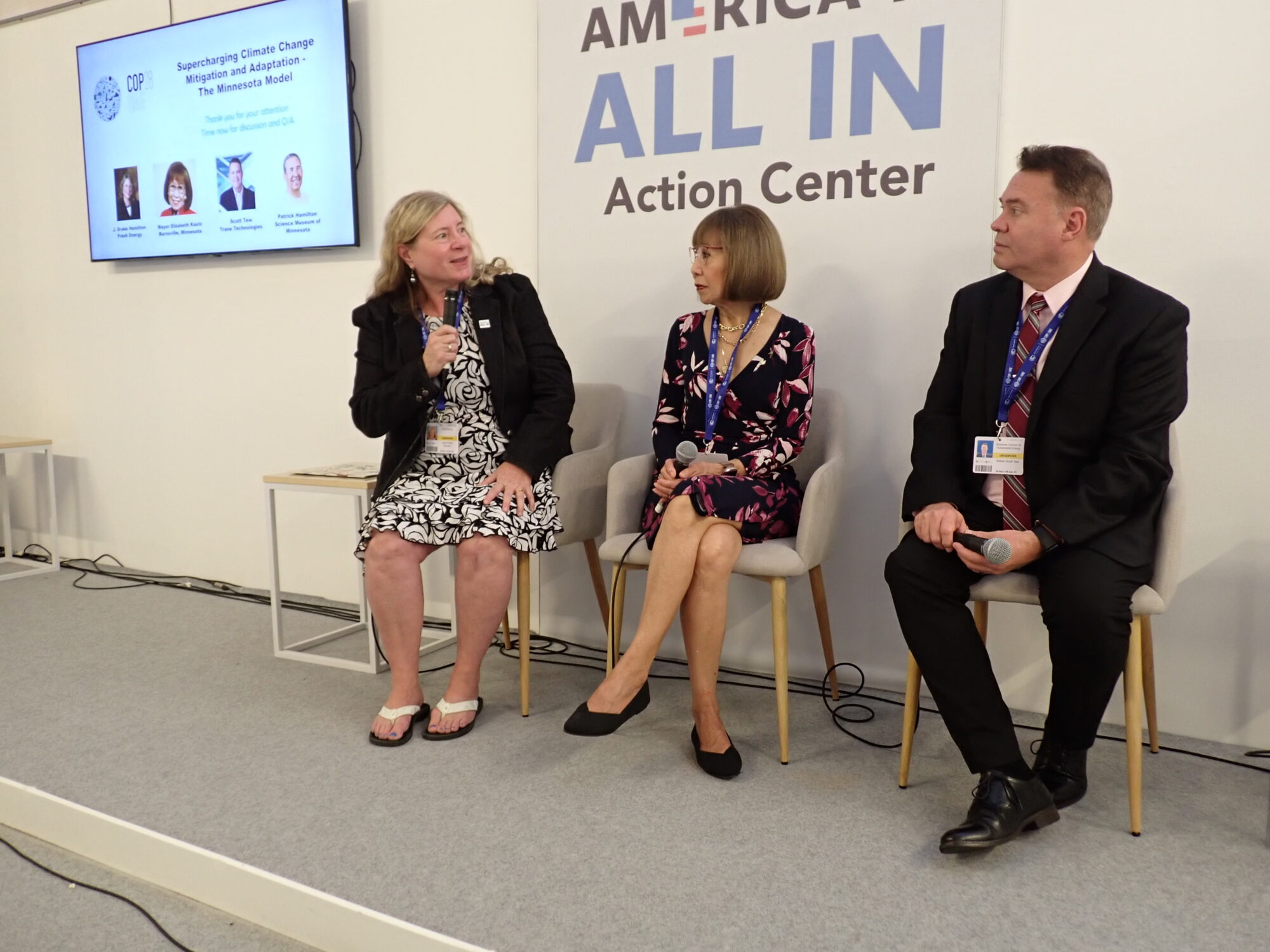
In Spring 2023, the Minnesota Legislature and Governor Walz enacted about 46 new clean energy and climate policies. From 100% carbon-free electricity by 2040 to extreme weather resilience, Minnesota’s climate action is an unprecedented response to reduce greenhouse gases and prepare for the climate changes already evident and those anticipated. It represents coverage across most of the state’s budget areas.
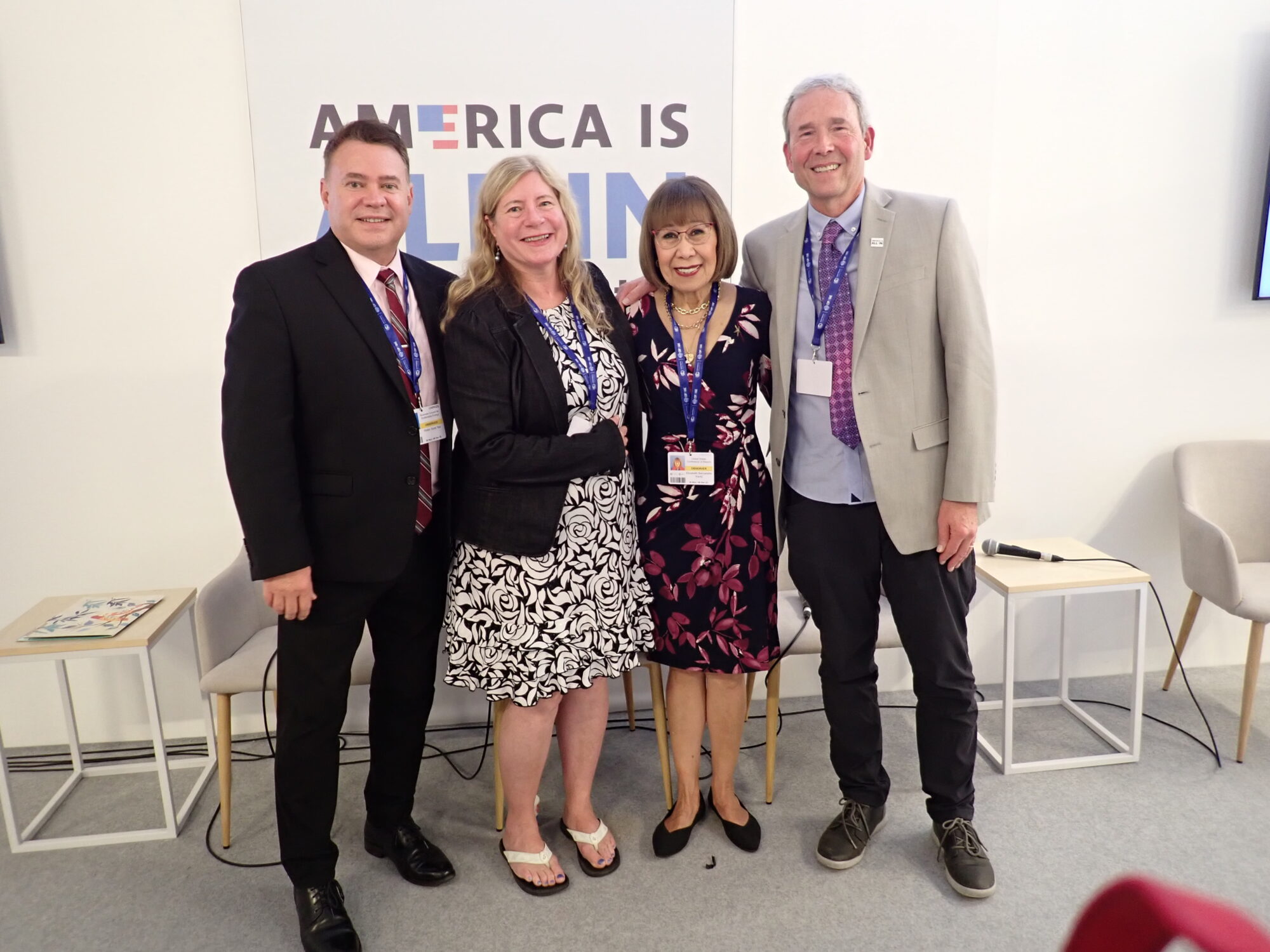
On Monday, December 4, this success story was shared at COP28 on the stage at the America Is All In pavilion. Starting with a video clip from Speaker of the Minnesota House Melissa Hortman, J. Drake Hamilton (Fresh Energy), Patrick Hamilton (Science Museum of Minnesota), Mayor Elizabeth Kautz (Burnsville, MN) and Scott Tew (Trane Technologies) spoke to how cultural institutions, non-governmental organizations, cities and business are responding to recent Minnesota and federal legislation to supercharge an all-of-society approach to the climate crisis.
December 3 | America Is All In pavilion opens at COP28
I was delighted to attend several sessions at the America Is All In pavilion yesterday in Dubai. December 3 was the first-ever Health Day at any COP. I chose to be there in person for the expertise of the panelists for an hour-long program titled “How an All-In Climate Strategy Can Improve Health and Socio-Economic Benefits.” The moderator was Gina McCarthy (on the right in the photo below), now the Managing Co-Chair of America Is All In.
I first met Gina McCarthy when she came to Saint Paul’s Science Museum of Minnesota in 2015—she then was the Environmental Protection Agency’s Administrator. My role back then was the leader of a group of about 20 climate experts around a table for a two-hour discussion about climate change in Minnesota. Later, in 2016, Gina McCarthy was in the White House with me and 11 other visitors who President Obama invited to spend an hour talking about climate action in our states.
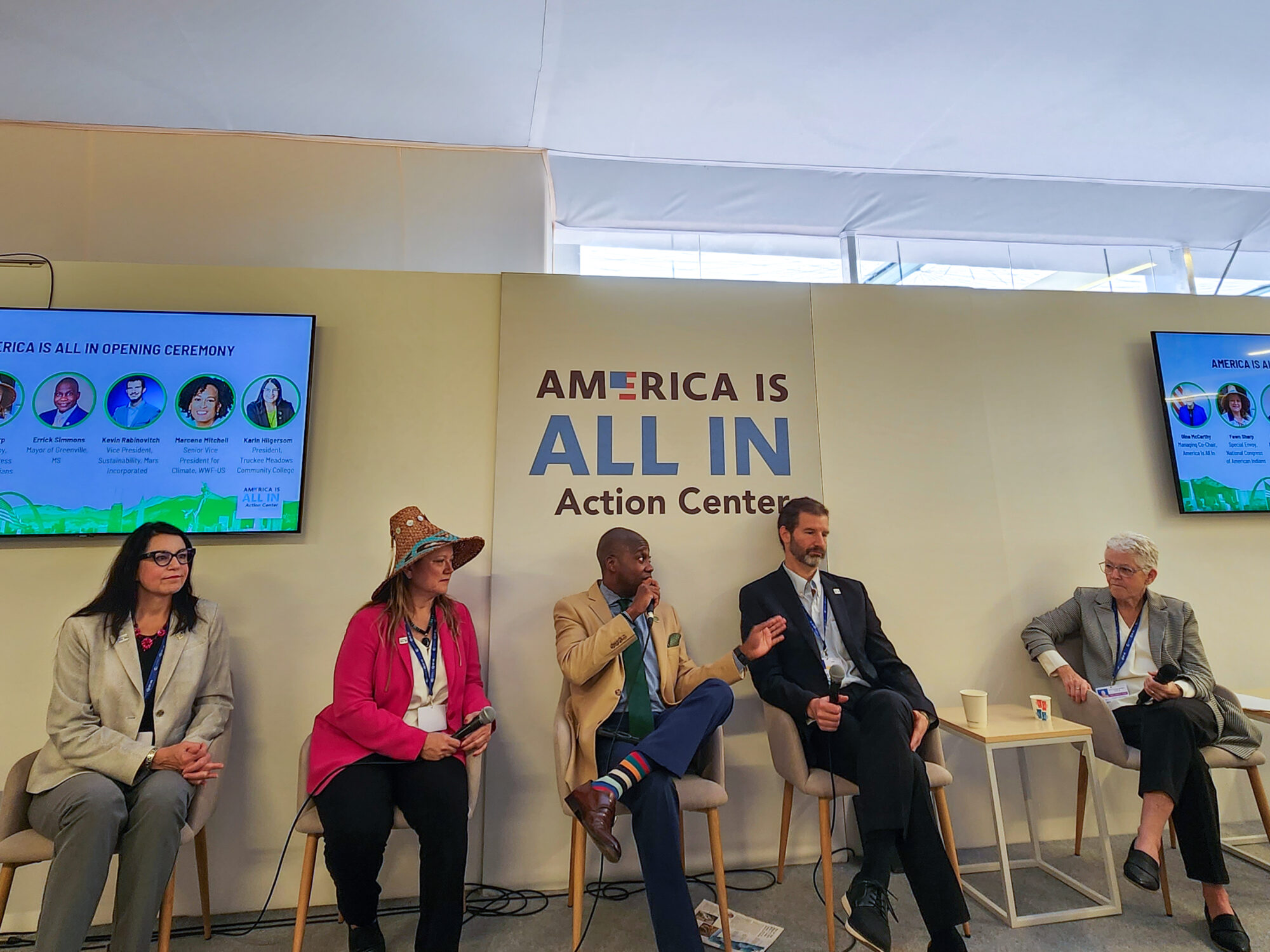
It was wonderful to speak with Gina McCarthy again, as she is a brilliant thinker and doer with a sharp mind and wonderful sense of humor. Yesterday. McCarthy drew out the best ideas for cutting air pollution from Liane Randolph, Chair of the California Air Resources Board, Harvard’s Gaurab Basu, M.D., and Shelly Schlenker from Commonspirit Health, who runs over 140 hospitals.
I will be in touch with all four of the panelists, because every speaker had great suggestions that we should promote in Minnesota. Stay tuned as we work to benefit from their careful work in cutting air pollution. I left the session with immediately useful information.
You might be as amazed as I was to learn as of yesterday that this global climate conference has 195 nations represented, with a whopping 97,372 registered participants. COP28 has become—by far—the best-attended COP in history.
Tomorrow I will report on our Monday, December 4, Fresh Energy-hosted one-hour discussion at the America Is All In pavilion: “Supercharging Climate Change Mitigation and Adaptation – The Minnesota Model.” Stay tuned!
December 1 | New climate fund for Global South
Today the United Arab Emirates (UAE) committed $30 billion in catalytic capital to a climate-focused investment vehicle to improve access to funding for the Global South. The investment vehicle, ALTERRA, will be based in Abu Dhabi and President Al Jaber will chair its board. It aims to mobilize $250 billion into projects that reduce greenhouse gas emissions, especially ones that are based in the Global South.
Reaching our emission reduction targets laid out in the Paris Agreement hinges on better financing to build climate solutions, and this is a great step in ensuring the Global South is not left out of the transition.
November 30 | COP28 Begins
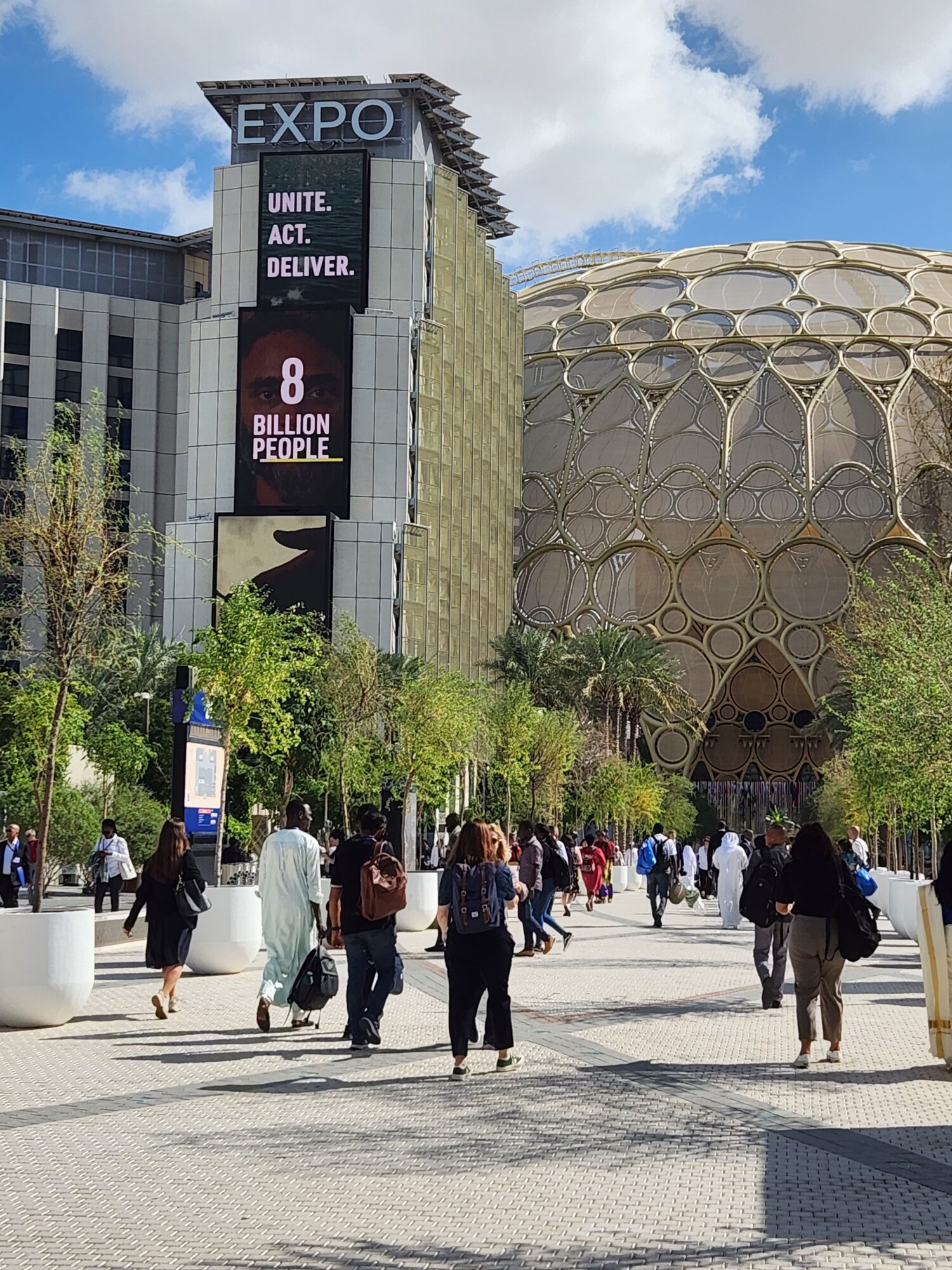
Today marks the first day of COP28. Seventy thousand people from nearly 200 nations are assembling in Dubai, United Arab Emirates (UAE), amid war and a global energy boom in the Persian Gulf city built by UAE’s oil wealth.
COP28 convened its opening ceremony convened, and I was in the room as COP28 President Sultan Ahmed Al Jaber led proceedings. “The UAE feels the urgency of this work; the world has reached a crossroads,” said President Al Jaber. “The road we’ve been on will not get us to our destination in time. We now have to find a new road, starting with a decision at the Global Stocktake to greatly accelerate climate action.”
President Al Jaber stated that there are three core elements that need to come together: mitigation, adaptation, and implementation—including financing, noting that there was no time to waste to reach consensus and not exceed 1.5 degrees Celsius of warming. “It is on me to focus like a laser on the 1.5-degree Celsius target set in the Paris Agreement,” he said. “The next two weeks will not be easy. We have to improve lives of people, and all of us need clean energy, clean water, clean food, and a safe and secure future,” said President Al Jaber.
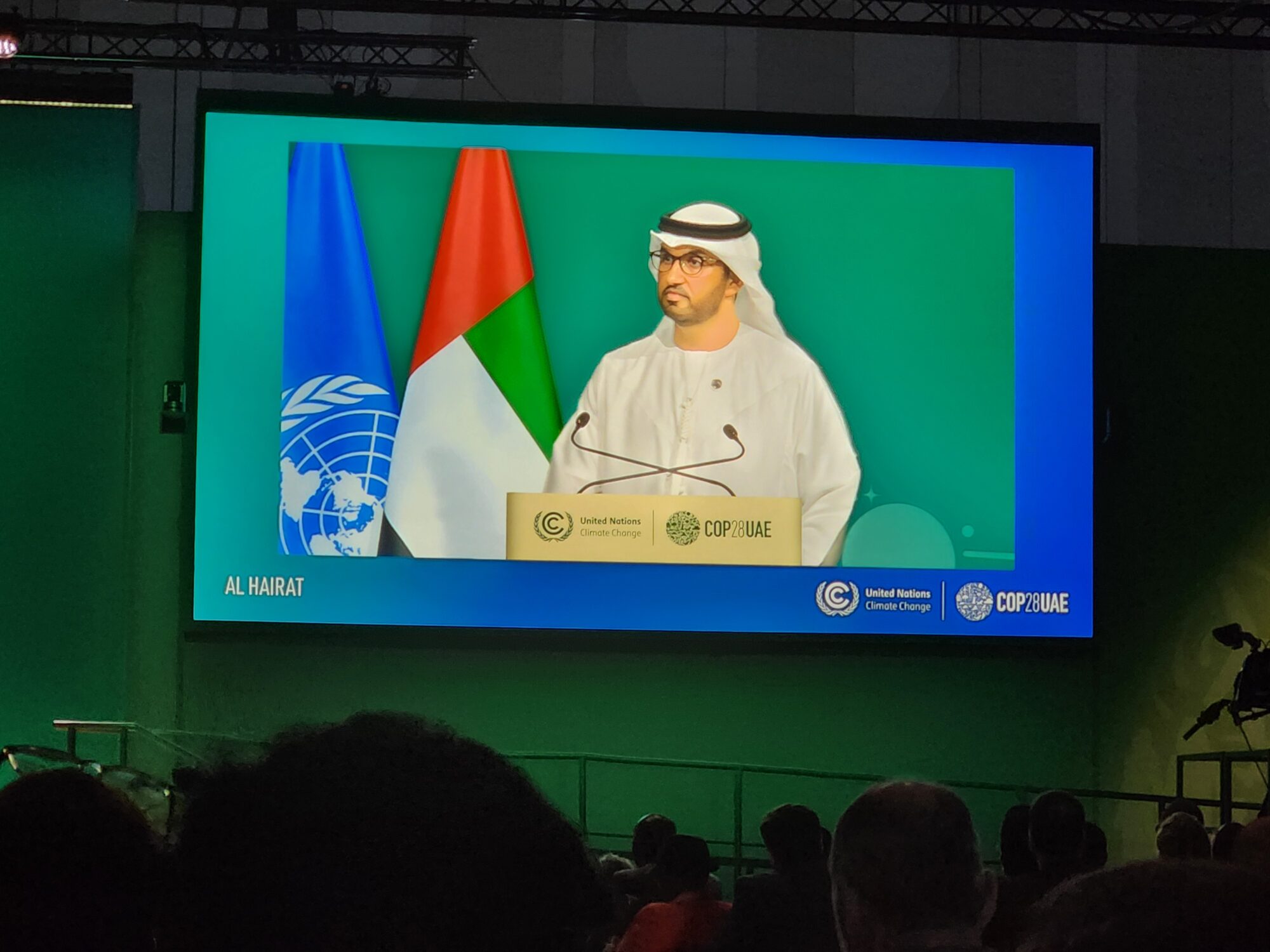
President Al Jaber has gone on record: We need these deep results, and the world cannot wait.
Another speaker was the Intergovernmental Panel on Climate Change (IPCC) Chair Simon Stiell, who is the Executive Secretary of the United Nationals Framework Convention on Climate Change (UNFCCC). He stated that we are on track to reach 3 degrees Celsius of global warming if we don’t greatly accelerate our global climate actions. “We must teach climate action to run,” said Chair Stiell. “We have to decide to make everyone on the planet safe, to commit to paying for Loss and Damage to the most vulnerable nations and commit to a new energy system.” Finally, Stiell pointed out that “in the next two years by early 2025 countries must deliver new, very robust national plans for climate action,” and that our children and grandchildren are “looking to us to speed up rapidly climate action.”
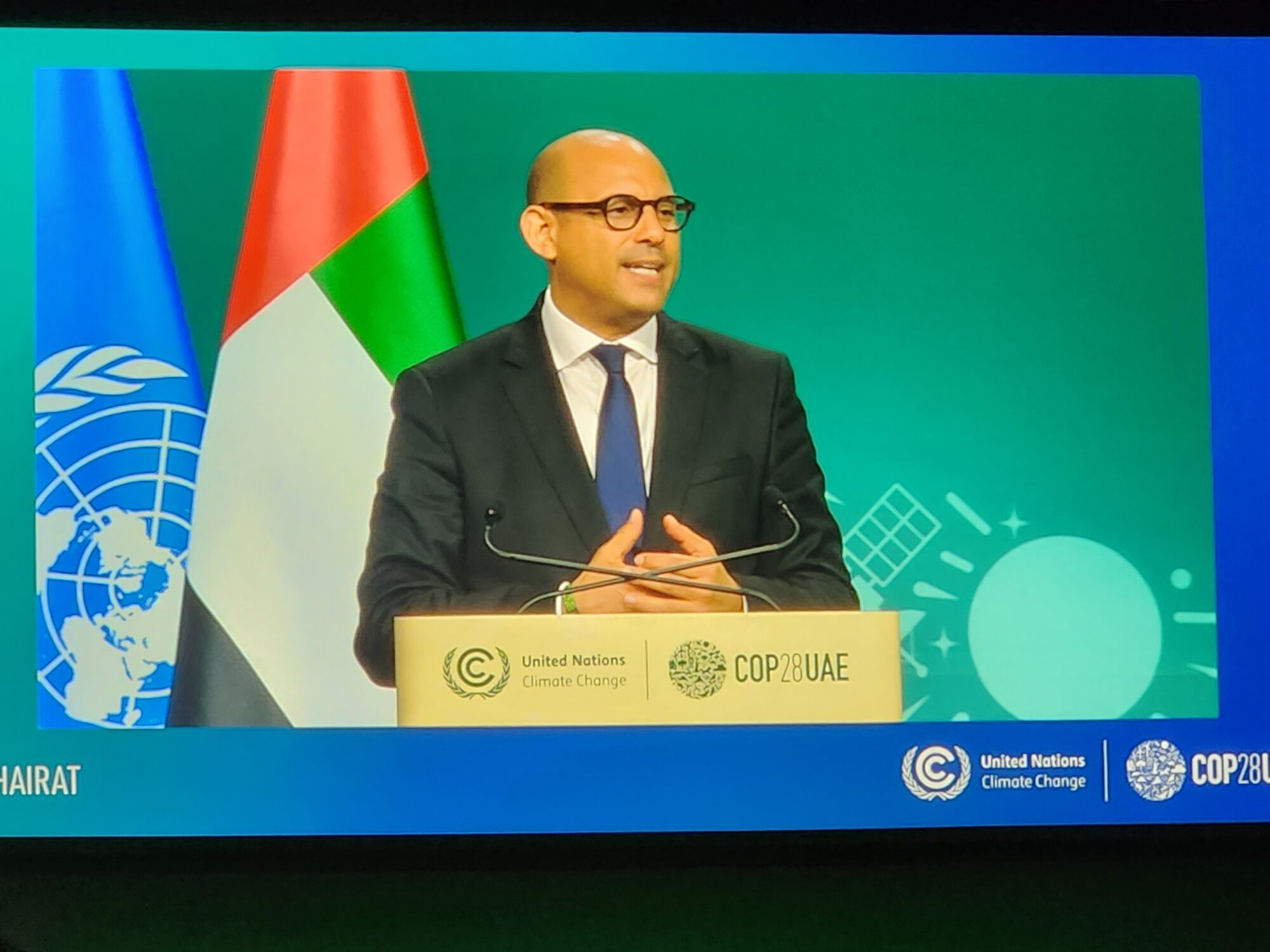
President Al Jaber announced the Loss and Damage Fund was the first agenda item before the UNFCCC ever adopted on day one of a U.N. Climate Change Conference. This international fund is now being operationalized based on consensus recommendations achieved at a special fifth meeting convened by now-President Al Jaber to help communities rebuild from the damages caused by climate change. The name of the fund is still to be determined. The deal announced for global climate damages means that delegates to COP28 will have one less thing to argue about over the next two weeks. The head of the U.S. negotiating team, Special Presidential Envoy John Kerry, said to me on November 29: “The nearly 200 Parties to the UNFCCC are going to have to move at a much, much faster rate and deploy many more trillions of dollars in order to achieve our goals. The U.S. is relentlessly in an effort to get what we need to win this battle.”
I will report to you what is decided by the end of COP28. My next post will summarize commitments from world leaders made on December 1 and 2. Expected speakers include over 100 leaders, including from India, France, Germany, as well as the highest-ranking American, Vice President Kamala Harris. The Pope is also expected to speak.
November 29 | J. Arrives in United Arab Emirates Before COP28
Hello from COP28 in Dubai, a city on the coast of the Persian Gulf in the United Arab Emirates (UAE) that is hosting this year’s annual climate summit. I arrived late last week to get familiarized with the unique features of Dubai before the summit kicks off. I couldn’t think of a better way than touring the world’s tallest building, Burj Khalifa, to see Dubai from an open balcony on the 148th floor. Check out the video below to see the supreme “out-sizedness” of Burj Khalifa—even in a city with hundreds of skyscrapers, it really stands out.
I learned on my tour that the Burj Khalifa collects 15 million gallons of water a year created by the condensation of humid air off the Gulf of Arabia. This allows the building owner to harvest and use the equivalent of fifteen Olympic-sized swimming pools of water on site.
I’m looking forward to tomorrow, the beginning day of COP28, where nearly 200 countries will convene and build consensus on climate action.
Please check back daily for updates from COP on what we’re discussing and how we’re progressing.
November 9, 2023 | Looking ahead to COP28 in the United Arab Emirates.
After a year of exciting progress for clean energy and climate, representatives from Minnesota and the U.S. are gearing up to attend the global climate summit, COP28, the U.N. Climate Change Conference in the United Arab Emirates. Get the scoop from J. on what she anticipates will be up for discussion, what the “gobal stocktake” will involve, and why this is the most important COP since Paris in 2015. Check out the video and audio recordings of J.’s webinar below.
